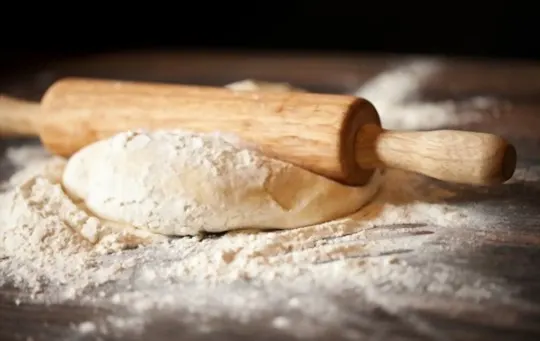Ever found yourself ready to roll out dough, only to realize the rolling pin’s gone AWOL?
It happens to the best of us. Suddenly, that pizza or pie seems miles away.
Luckily, we’ve got you covered with some genius alternatives you’ve likely got lying around.
No rolling pin? No problem! We’re here to keep your baking game strong, no matter what.
Ever used a wine bottle as a rolling tool? Guess what, it’s just the beginning.
We’re about to dive into the world of improvisation that’ll make your baked goods just as delightful, with or without the traditional tools.
What’s Rolling Pin?

A rolling pin is a simple kitchen tool that can be used for a variety of tasks, from rolling out dough to crushing herbs.
It consists of a barrel with handles attached at either end.
The barrel can be made from a variety of materials, including wood, ceramic, glass, or metal.
To use a rolling pin, simply place it on a flat surface and roll it back and forth.
The amount of pressure you apply will depend on the task you are performing.
For example, if you are rolling out dough, you will need to apply more pressure than if you are crushing herbs.
Rolling pins are an essential tool for any home cook or baker.
They offer a quick and easy way to achieve consistent results when preparing food.
Using a rolling pin is a fairly straightforward process.
First, choose the appropriate surface on which to roll out your dough or crush your herbs.
A cutting board or countertop will work well.
If you are working with delicate dough, you may want to use a sheet of parchment paper to prevent sticking.
Place the rolling pin on the surface and apply pressure as you roll it back and forth.
For the dough, you will need to apply enough pressure to flatten it out without tearing it.
For herbs, you will want to use light pressure to avoid smashing them.
When finished, simply wipe down the rolling pin with a damp cloth and store it in a dry, safe place.
The 5 Best Substitutes for Rolling Pin
If you don’t have a rolling pin, there are several household items that can be used as substitutes.
In a pinch, a wine bottle or can of soup be used to roll out dough.
1 – Wine Bottle

Rolling out dough can be a pain-literally.
There’s nothing worse than working hard on a perfect pie crust only to have it fall apart when you go to roll it out.
The key to success is to use a rolling pin that’s the right size and shape for the job.
That’s why a wine bottle makes such a great substitute.
It’s the perfect size for small pies and tarts, and the long, slender shape ensures even results.
Best of all, it’s probably something you already have on hand, so there’s no need to run out and buy anything special.
Just grab a bottle of your favorite wine and get rolling.
2 – Water Bottle

A water bottle is a great kitchen tool – and not just for keeping you hydrated.
Here are three ways a water bottle can come in handy in the kitchen.
First, if you don’t have a rolling pin, a water bottle can be a great substitute.
Just remove the cap and use the bottle to roll out the dough.
Second, a water bottle is great for spritzing herbs or greens that are wilting.
Just fill the bottle with water and give them a quick spritz.
The water will help to revive them, and they’ll be good as new.
Finally, if you’re making a dish that requires delicate ingredients (like chopped herbs or grated cheese), a water bottle can be used to lightly mist them before cooking.
This will help to prevent them from sticking or burning.
3 – Can of Soup

You might not think that a can of soup would have much to do with baking, but it can actually be a handy substitute for a rolling pin.
If you don’t have a rolling pin or your dough is too sticky to roll out, try using a can of soup instead.
Just open the can and press it into the dough to flatten it.
You can also use the can to roll out the dough by placing it on one end and rotating it.
This trick works best with thin, round cans like soup cans, but you can also use a thick, rectangular can if you don’t have anything else.
Just make sure that the can is clean and dry before using it.
4 – Vase

A vase is a necessity for any household.
Not only is it necessary for holding flowers, but a vase can also be used for a variety of other purposes.
From holding water to being used as a decoration, a vase is an essential item in any home.
However, many people do not realize that a vase can also be used as a rolling pin.
Simply place the vase on top of the dough and roll it out until it is the desired thickness.
This is a great substitute for a rolling pin and can save you time and money.
5 – PVC Pipe

PVC pipe is a versatile product that can be used for a variety of purposes, both inside and outside the home.
For example, PVC pipe can be used to create a homemade rolling pin.
Simply cut the pipe to the desired length, sand down any sharp edges, and voila.
You’ve got yourself a sturdy rolling pin that’s perfect for rolling out dough.
PVC pipe can also be used to create a variety of other household items, such as shelving, picture frames, and more.
Conclusion
In conclusion, there are a variety of household items that can be used as substitutes for a rolling pin.
From a wine bottle to a PVC pipe, there are many options to choose from.
The best substitute for a rolling pin depends on the situation and what you have on hand.
However, all of the substitutes listed above are great options that will get the job done.
So, next time you’re in a pinch, don’t be afraid to get creative and use one of these household items as a rolling pin.

The 5 Best Substitutes for Rolling Pin
Ingredients
- Wine Bottle
- Water Bottle
- Can of Soup
- Vase
- PVC Pipe
Instructions
- Pick your favorite substitute from the list above.
- Follow cooking directions for your selected substitute with the proper ratio of ingredients.

Andrew Gray is a seasoned food writer and blogger with a wealth of experience in the restaurant and catering industries. With a passion for all things delicious, Andrew has honed his culinary expertise through his work as a personal chef and caterer.
His love for food led him to venture into food writing, where he has contributed to various online publications, sharing his knowledge and insights on the culinary world. As the proud owner of AmericasRestaurant.com, Andrew covers a wide range of topics, including recipes, restaurant reviews, product recommendations, and culinary tips.
Through his website, he aims to inspire and educate fellow food enthusiasts, offering a comprehensive resource for all things food-related.

Leave a comment